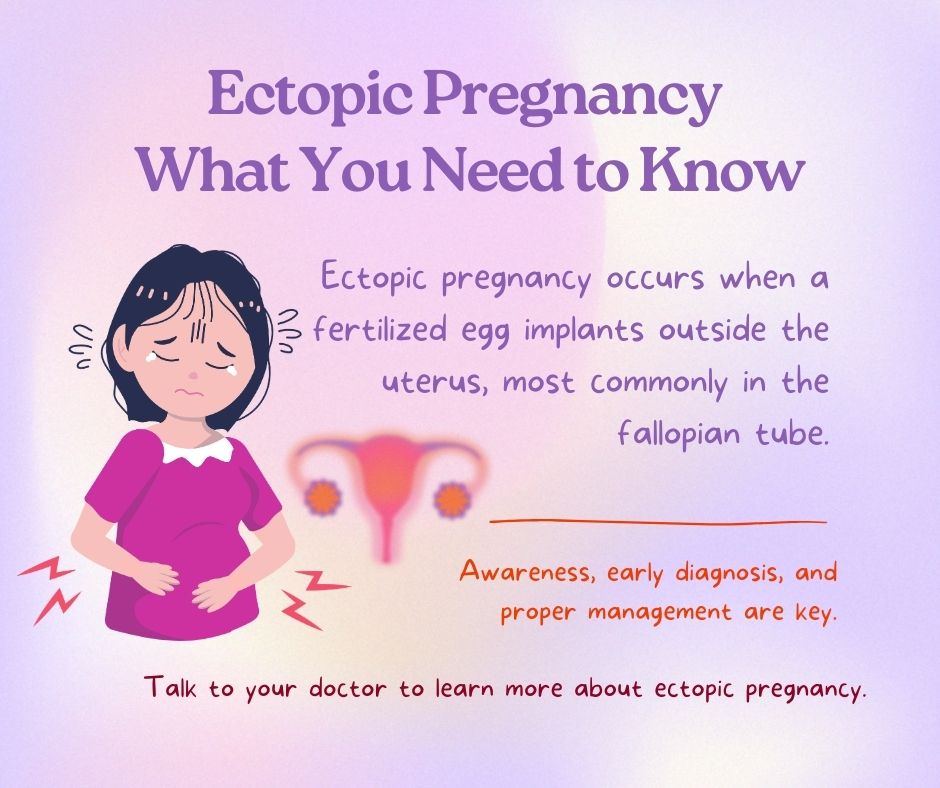Ectopic Pregnancy – What You Need to Know

Ectopic Pregnancy: What You Need to Know
Ectopic pregnancy occurs when a fertilized egg implants outside the uterus, most commonly in the fallopian tube. Since the embryo cannot develop properly in this location, it poses serious health risks if left untreated. If the embryo continues to grow, it may cause the fallopian tube to rupture, leading to severe internal bleeding that can be life-threatening.
For those planning a pregnancy, it’s crucial to be aware of the symptoms and seek early prenatal care to ensure a safe and healthy pregnancy.
Symptoms of Ectopic Pregnancy
If you experience any of these symptoms, seek medical attention immediately:
🔹 Severe lower abdominal pain, sometimes radiating to the rectum, thighs, or shoulders
🔹 Vaginal bleeding, usually light but abnormal
🔹 Dizziness, fainting, or feeling weak
🔹 Shock due to excessive blood loss (in severe cases)
Causes of Ectopic Pregnancy
Several factors can increase the risk of ectopic pregnancy, including:
1️⃣ Abnormal Fallopian Tubes – If the fallopian tubes are damaged or have scarring, the fertilized egg may get stuck before reaching the uterus. Causes include:
- Pelvic infections from sexually transmitted diseases (STDs) leading to scarring
- Scar tissue from previous surgeries affecting the fallopian tubes
- History of ectopic pregnancy
- Previous tubal sterilization or reversal procedures
2️⃣ Use of Certain Medications or Hormones that affect reproductive function
3️⃣ Hormonal Imbalances that interfere with embryo implantation
4️⃣ Maternal Age – Women aged 35 and older are at higher risk due to potential changes in reproductive organ function
How Is Ectopic Pregnancy Diagnosed?
Doctors use a combination of methods to diagnose ectopic pregnancy, including:
✔️ Reviewing medical history and symptoms
✔️ A pelvic exam to check for abnormalities
✔️ Blood tests to measure hCG levels
✔️ Transvaginal ultrasound – If the embryo is not detected inside the uterus but is seen elsewhere, it suggests an ectopic pregnancy
Treatment for Ectopic Pregnancy
🔹 Medication Treatment – The drug Methotrexate is often used to stop cell growth in cases where the pregnancy is small and there is no severe bleeding.
🔹 Surgical Treatment – If medication is not effective or the condition is severe, surgery may be required to remove the ectopic pregnancy. The two main surgical options are:
- Laparoscopic surgery (minimally invasive) – Small incisions, faster recovery
- Open abdominal surgery – Used in emergency cases or if the fallopian tube has ruptured
🔹 Managing Complications – If excessive bleeding occurs, a blood transfusion may be necessary. Antibiotics may also be required to treat infections.
How to Reduce the Risk of Ectopic Pregnancy
While ectopic pregnancy cannot always be prevented, certain lifestyle choices can help reduce the risk:
✅ Engage in safe sexual behaviour – Use condoms and limit multiple partners to prevent STDs and pelvic infections
✅ Avoid smoking – Smoking increases the risk of ectopic pregnancy
✅ Pay attention to pregnancy symptoms – If you experience unusual abdominal pain or vaginal bleeding, consult a doctor immediately
Final Thoughts
Ectopic pregnancy is a serious condition that requires immediate medical attention. Understanding the symptoms and risk factors can help ensure early detection and proper treatment.
If you’re planning to conceive and have concerns about your fertility, our team of specialists is here to provide expert guidance and personalized care to support you on your journey to parenthood.






